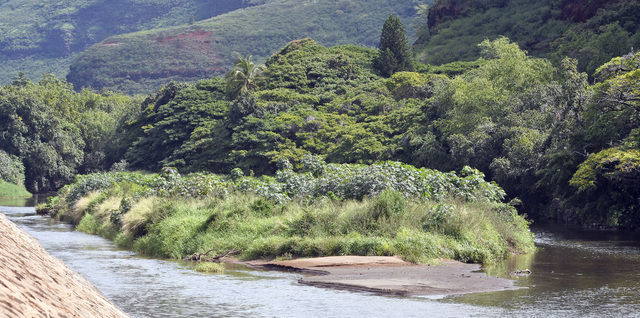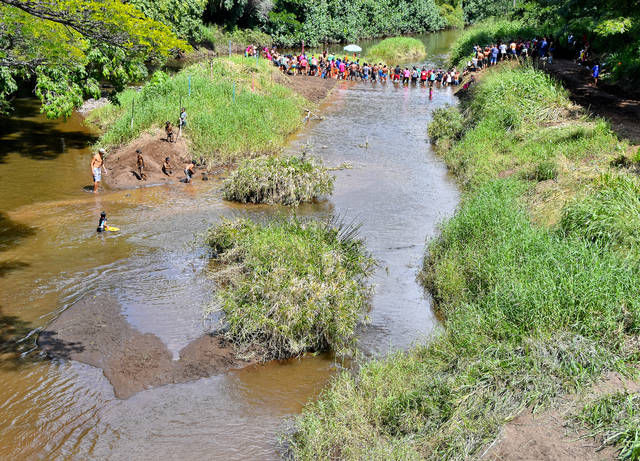WAIMEA — After more than 100 years, water is being returned to the Waimea River. On Tuesday, the Hawaii Commission on Water Resource Management approved a mediated settlement reached in a complaint that “will immediately restore continuous flows in the
WAIMEA — After more than 100 years, water is being returned to the Waimea River.
On Tuesday, the Hawaii Commission on Water Resource Management approved a mediated settlement reached in a complaint that “will immediately restore continuous flows in the Waimea River, as well as provide the opportunity for a renewable energy project, water for Hawaiian homesteading, and farming,” according to a release from the state Department of Land and Natural Resources.
The decision is in regards to a complaint made by Po‘ai Wai Ola/West Kauai Watershed in 2013 against the state-run Agribusiness Development Corporation and the Kekaha Agriculture Association, claiming too much water was being diverted from Waimea River.
“Today’s agreement ensures, that for the first time in over 100 years, life-giving water will once again flow continuously in Waimea River, from mauka (mountain) to makai (sea), which is vital for the health of the river and our community,” said Galen Kaohi, president of Po‘ai Wai Ola.
Under the agreement, tens of millions of gallons of water will be restored to the river daily; water that is currently being diverted through a system of ditches built in the early 1900s.
“On behalf of the state of Hawaii Agribusiness Development Corporation and the Kekaha Agriculture Association, we are honored and proud to be part of a community that was able to resolve this critical issue through collaboration. This agreement establishes a foundation upon which farmers can build the future of agriculture on the Westside of Kauai,” said James Nakatami, executive director of the ADC.
The Kauai Island Utility Cooperative was also one of the parties in the settlement, and is proposing a dual-purpose project, including both renewable energy and delivery of water, according to the release.
“We are pleased that this important step has been taken and we’ve come to agreement with the parties on the framework for the stewardship of land and water and responsible use of the resources in West Kauai,” said Dave Bissell, KIUC CEO.
“Should the proposed KIUC renewable energy project come to fruition, KIUC could increase its renewable portfolio by ten percent or more with pumped storage hydro, while supporting (Department of Hawaiian Homelands) and others in expanding agricultural, residential and economic opportunities on the Westside,” Bissell said.
Parties involved in the mediation said they were pleased at the short time frame — about a year — that it took to get the matter resolved.
“Historically, Hawaii’s highly contentious water disputes have taken many years, if not decades to settle,” said state Board of Land and Natural Resources Chairwoman Suzanne Case. “This is (a) historic agreement. During this process, the commission sought not only to resolve the claims brought by the Po‘ai Wai Ola hui, but to provide a mechanism for dealing with complex water issues holistically.”
The establishment of the Kekaha and Kokee ditch systems by the Kekaha Sugar Plantation in the early 1900s started the diversion of the water flowing down the Waimea River and its tributaries to grow sugar.
In 2001, the plantation went out of business and the state took over the ditch network though Agribusiness Development Corporation, which leased the ditch network and lands to the Kekaha Agriculture Association.
The state didn’t change the amount of water being diverted from the river, even though the association wasn’t using as much land as Kekaha Sugar Company.
Minimum stream flows that are necessary for native stream life, and traditional native Hawaiian practices, will be guaranteed, and a framework will be created to allow future, beneficial environmental and cultural projects, according to a release from Earthjustice, the organization representing Po‘ai Wai Ola in the complaint.
“For too long, private interests have been allowed to take the public’s water and use it to reap private profits,” said Earthjustice attorney David Henkin. “In approving this agreement, the Water Commission is carrying out its constitutional and statutory mandate to protect the public trust.”
And while the decision opens the doors for many future opportunities, some Kauai residents say it’s time the spotlight falls on all of the diversions out of rivers on the island.
“This is an example of the paradigm shift and the convergence of the sacred laws of the land with the ideals of democracy,” said Ana Mohamad DesMarais, a Kauai resident who is concerned about diversions from rivers island-wide for agriculture and private use. “All will be restored, it is in progress.”
Using the settlement as an example for other disputes is exactly what the Water Commission intends to do, according to DLNR.
“We are pleased that this example of multi-party environmental dispute resolution addressed complex issues in a comprehensive manner,” Case said. “It is the result of an effort to find creative solutions and broad commonalities through the dedication and hard work of all parties involved.”



